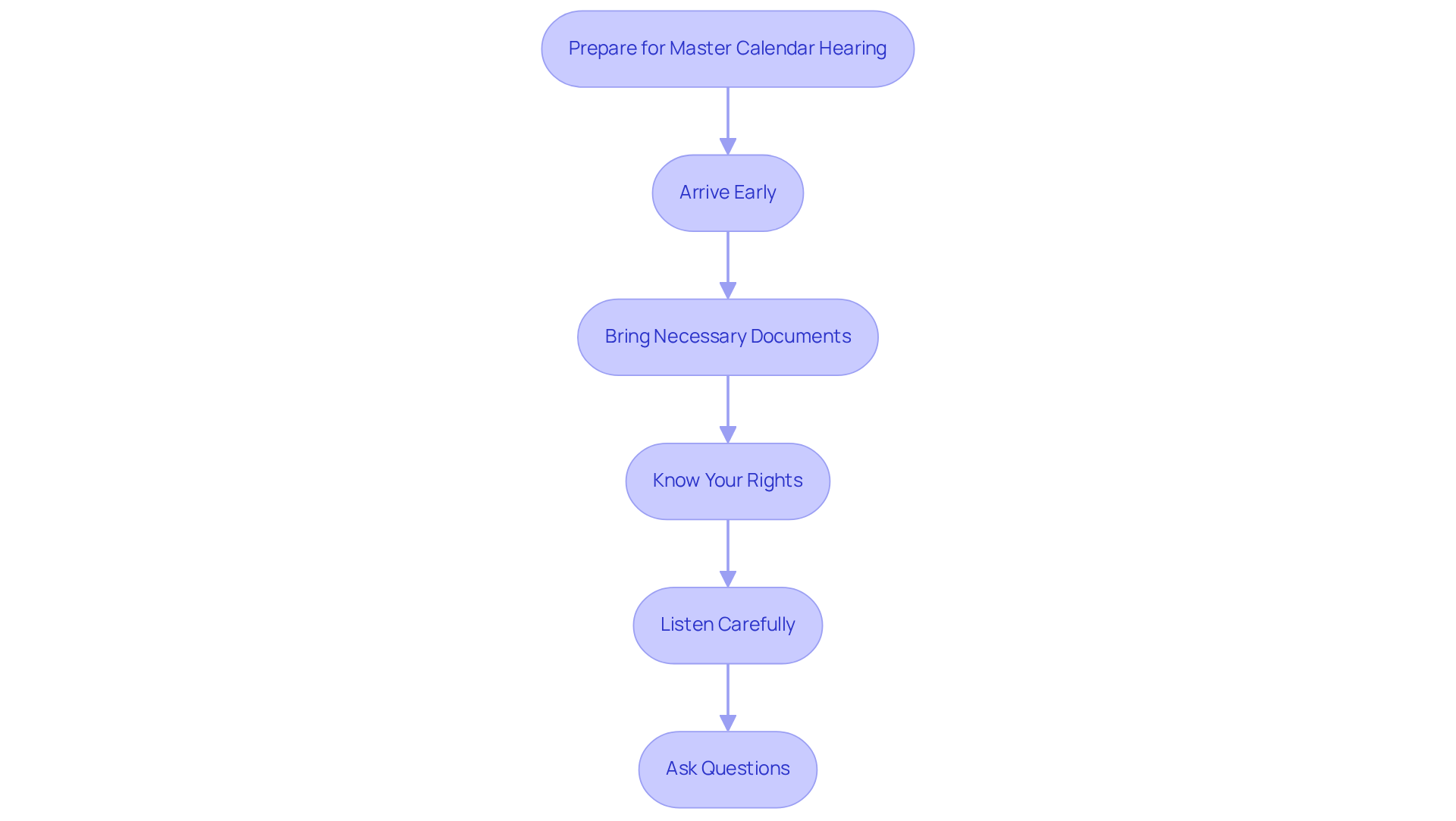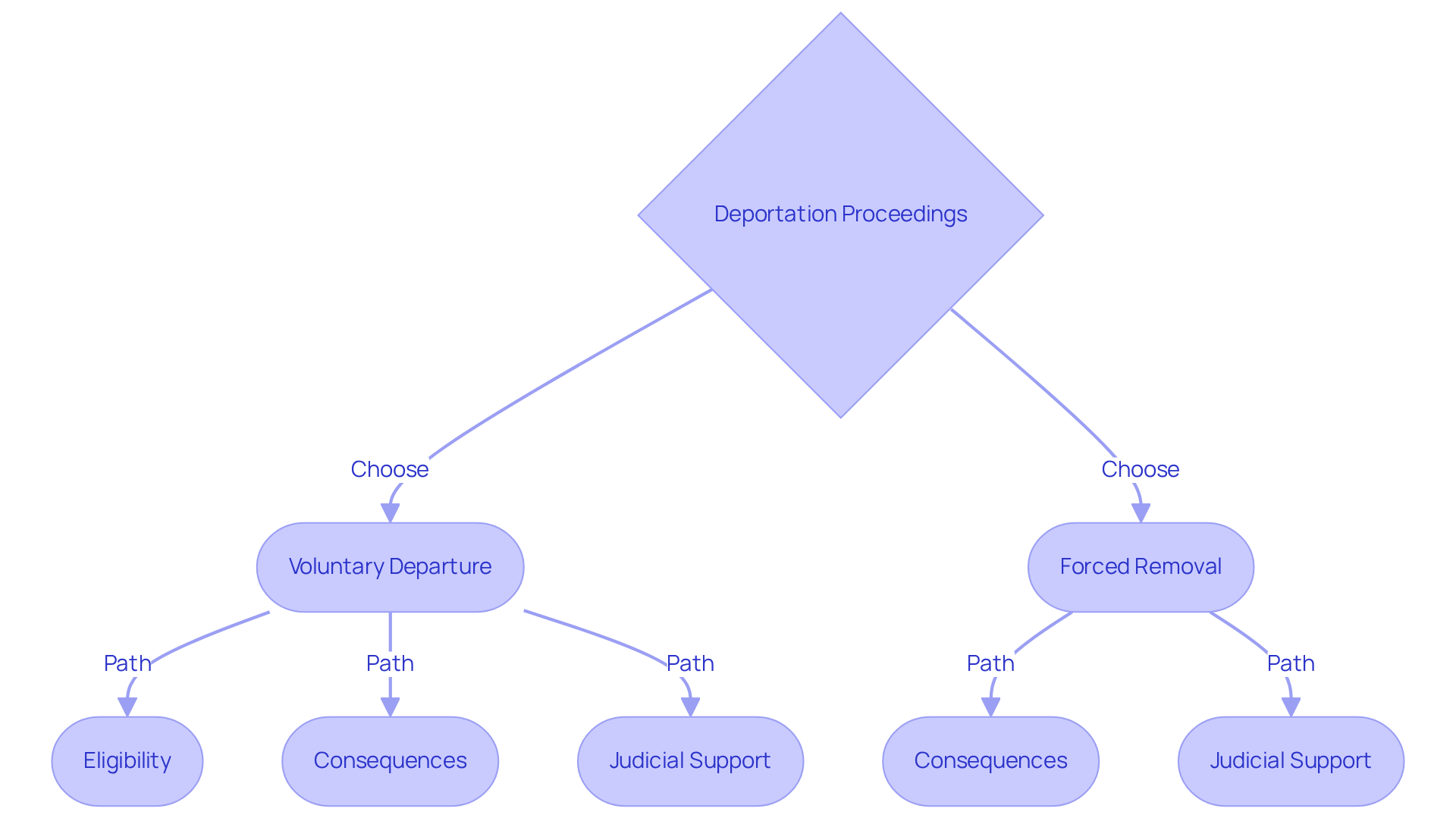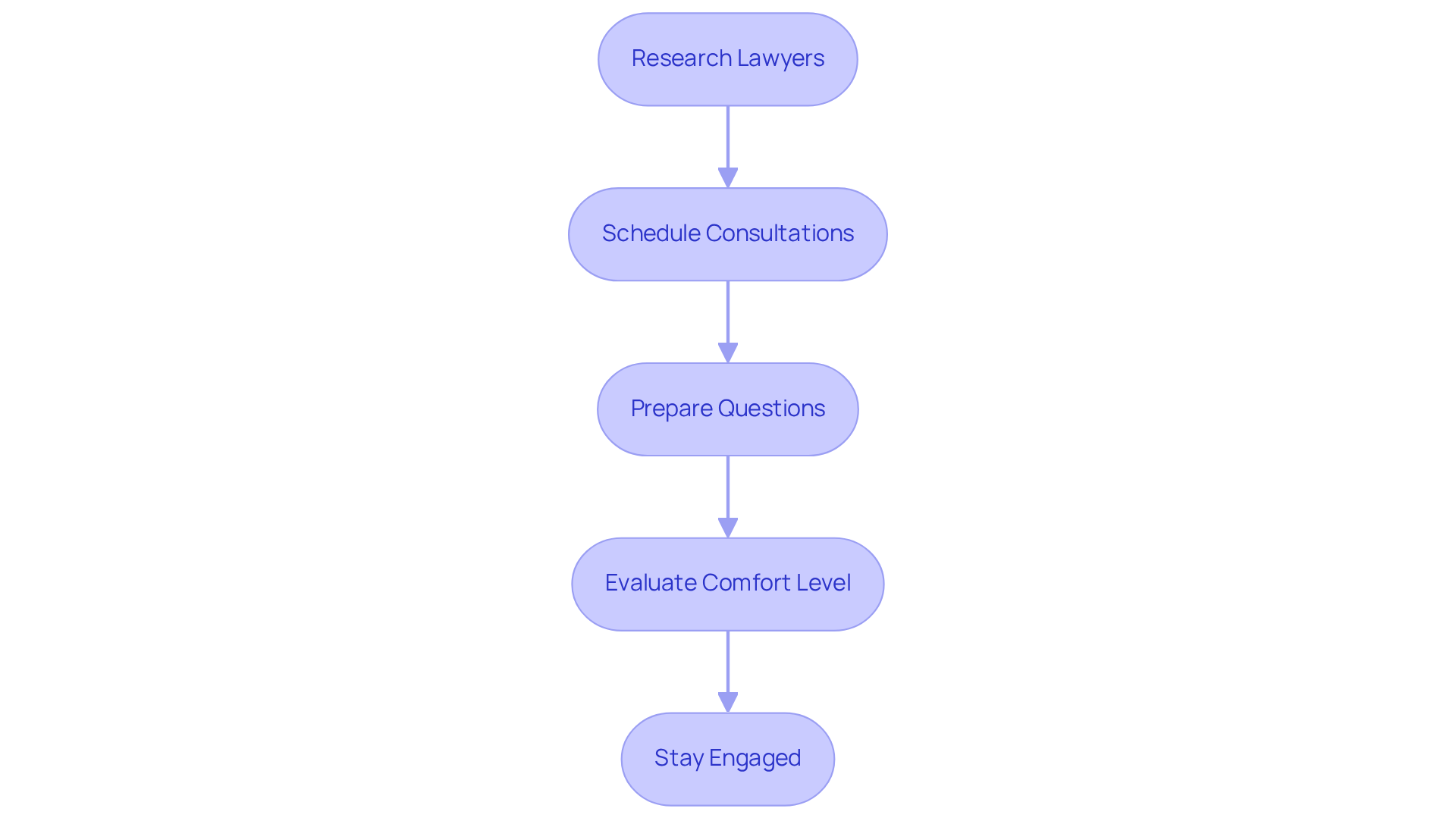Introduction
Facing deportation proceedings can feel overwhelming for immigrants at risk of removal from the United States. It’s crucial to understand the essential steps to take after receiving a Notice to Appear, as this knowledge can significantly influence the outcome of your case. Have you ever felt lost in the immigration process? With so much at stake, how can you ensure you’re prepared and informed to defend your rights?
This guide explores the critical actions you should take during this challenging time. It emphasizes the importance of having legal representation and outlines the options available to those facing deportation. Remember, you’re not alone in this fight—we’re here to support you every step of the way.
Receive Notice to Appear in Removal Proceedings
Receiving a Notice to Appear (NTA) is a pivotal moment in your immigration journey, and it demands your immediate attention. This document holds crucial information: your name, the charges against you, and the date and location of your first hearing. Here’s how to navigate this situation effectively:
- Verify the Information: Make sure all your personal details—like your name, date of birth, and address—are correct. If you spot any discrepancies, fix them right away to prevent complications.
- Understand the Charges: Take the time to thoroughly review the charges listed in the NTA. Knowing what you’re up against is essential for preparing your defense against deportation proceedings.
- Mark Important Dates: Keep track of your first hearing date and any deadlines for submitting documents or applications for relief. Missing these dates can lead to serious consequences.
- Gather Documentation: Collect any relevant documents that could support your case, such as proof of residency, employment records, or evidence of family ties in the U.S. This documentation can be crucial in your defense.
- Stay Informed: Educate yourself about your rights and the deportation proceedings. Understanding the regulatory environment will empower you to make informed choices as you prepare for your hearing.
Statistics reveal that individuals with attorney representation achieve significantly better outcomes in court, with a 97% lower likelihood of receiving a removal order. Seeking help from an experienced legal advisor can greatly enhance your chances of successfully contesting the NTA. Remember, you’re not alone in this fight—we’re here to support you every step of the way.

Attend the First Hearing in Immigration Court
The initial hearing in immigration court, known as the Master Calendar Hearing, is a vital step in your journey. Here’s how to prepare effectively:
- Arrive Early: Get to the courthouse at least 30 minutes before your hearing. This gives you enough time for security checks and to find the right courtroom.
- Bring Necessary Documents: Make sure you have your Notice to Appear (NTA), identification, and any supporting documents relevant to your case.
- Know Your Rights: Understanding your rights is essential. You have the right to counsel and the opportunity to present your case. Legal representation can significantly influence outcomes; studies show that individuals with representation are 97% more likely to continue attending their hearings. If you haven’t consulted with an attorney yet, consider scheduling a free consultation with Vasquez Law Firm. We’ll provide personalized legal advice tailored to your situation. The consultation process includes scheduling your free meeting, discussing your case details, and exploring your options.
- Listen Carefully: Pay close attention to the judge’s instructions and any questions asked. This is your chance to clear up any misunderstandings.
- Ask Questions: If something isn’t clear, don’t hesitate to seek clarification from the judge or your attorney. Actively engaging in your hearing can make a significant difference.
Preparation is key to navigating the complexities of immigration court, and knowing your rights empowers you during this process. If you receive a subpoena or face urgent issues, remember that Vasquez Law Firm is available 24/7 for emergency support. Don’t hesitate to reach out for assistance.

Explore Outcomes: Voluntary Departure vs. Forced Removal
In deportation proceedings, you may have the opportunity to request voluntary departure rather than confronting forced removal. Here’s what you need to know:
-
Voluntary Departure: This option lets you leave the U.S. on your own terms, avoiding a formal removal order. It can be a smart choice, as it helps you steer clear of the long-term consequences that come with deportation proceedings.
- Eligibility: To qualify, you need to show good moral character and agree to leave by a specified date. Legal experts stress that meeting these criteria is crucial for a successful application.
- Consequences: If granted, you can reapply for entry into the U.S. in the future. However, failing to depart as agreed can lead to serious penalties, including deportation proceedings and a reentry bar lasting several years.
-
Forced removal may take place if you don’t qualify for voluntary departure or decide not to pursue it, resulting in deportation proceedings.
- Consequences: A removal order can keep you from re-entering the U.S. for several years, depending on your situation. In 2024, around 678,000 individuals were repatriated, highlighting the scale of forced removals.
- Judicial Support: It’s vital to have assistance to explore all options and understand the implications of each choice. Data shows that having an attorney significantly boosts the chances of positive outcomes in migration matters, especially in critical situations like deportation.

Seek Legal Assistance for Effective Representation
Finding the right legal representation is crucial for successfully navigating deportation proceedings. Here are key steps to consider:
-
Research Lawyers: Look for immigration attorneys with a solid track record in deportation matters. Check their credentials, client testimonials, and success rates to gauge their effectiveness. For example, Vasquez Law Firm has over 30 years of experience and an impressive 98% success rate, making them a trusted choice for many families in North Carolina and Florida.
-
Schedule Consultations: Many attorneys offer free initial consultations. Take this opportunity to discuss your specific circumstances and evaluate their strategy for your case. Vasquez Law Firm provides free consultations with experienced attorneys dedicated to personalized attention and aggressive representation, including bilingual services for Spanish-speaking clients.
-
Prepare Questions: During consultations, ask about their experience with cases like yours, their strategic approach, and their fee structure. Understanding these aspects helps you make an informed decision. At Vasquez Law Firm, clients can expect a transparent discussion about fees.
-
Evaluate Comfort Level: Choose an attorney you feel comfortable with. Trust is essential, as you’ll need to share sensitive personal information and rely on them to advocate for your interests. The caring team at Vasquez Law Firm understands the unique challenges faced by immigrant families and strives to be their advocate in the justice system.
-
Stay Engaged: After hiring an attorney, stay actively involved in your case. Provide all necessary documentation promptly and keep communication open to facilitate the best possible outcome. With Vasquez Law Firm, you can count on 24/7 availability and support throughout your legal journey.
Legal counsel significantly impacts the outcomes of immigration cases, particularly in deportation proceedings. Statistics show that individuals with representation are more likely to succeed; for instance, 77% of individuals accused of entering without inspection who had representation were allowed to stay in the U.S. Moreover, "With attorney assistance, applicants are more likely to submit comprehensive and well-supported claims." As you navigate this challenging process, remember that your choice of attorney can make a substantial difference in your situation's outcome. It's also important to note that representation rates in immigration cases have dropped from 65% to just 30% over the past five years, highlighting the urgent need for accessible legal support.

Conclusion
Navigating deportation proceedings can feel overwhelming for immigrants. But understanding the essential steps can significantly influence the outcome. This guide highlights the importance of being proactive—from verifying the Notice to Appear to seeking legal assistance. Every action taken helps build a stronger case and empowers individuals to face their circumstances with confidence.
Key insights include:
- The necessity of attending the first hearing prepared
- Knowing your rights
- The advantages of having legal representation
Statistics show that individuals with an attorney are more likely to achieve favorable results, underscoring the critical role legal guidance plays in these proceedings. Additionally, exploring options like voluntary departure can provide alternatives to forced removal, allowing individuals to make informed decisions about their futures.
Ultimately, the journey through deportation proceedings is fraught with challenges, but it’s also a path where knowledge and support can lead to better outcomes. Immigrants are encouraged to take immediate action, stay informed, and seek qualified legal representation to navigate this complex process effectively. By doing so, you can advocate for your rights and work towards a resolution that aligns with your aspirations and circumstances. Remember, we’re here to fight for your family—your future matters to us. Yo Peleo — We Fight.
Frequently Asked Questions
What is a Notice to Appear (NTA) in immigration proceedings?
A Notice to Appear (NTA) is a crucial document in your immigration journey that contains important information such as your name, the charges against you, and the date and location of your first hearing.
What should I do upon receiving an NTA?
You should verify the information on the NTA for accuracy, understand the charges against you, mark important dates related to your hearing, gather relevant documentation to support your case, and stay informed about your rights and the deportation process.
How can I verify the information on my NTA?
Check that all your personal details, including your name, date of birth, and address, are correct. If you find any discrepancies, address them immediately to avoid complications.
Why is it important to understand the charges listed in the NTA?
Understanding the charges is essential for preparing your defense against deportation proceedings, as it helps you know what you are up against.
What should I keep track of after receiving an NTA?
You should keep track of your first hearing date and any deadlines for submitting documents or applications for relief, as missing these dates can lead to serious consequences.
What kind of documentation should I gather to support my case?
You should collect relevant documents such as proof of residency, employment records, or evidence of family ties in the U.S., as these can be crucial for your defense.
How can staying informed about my rights help me in the deportation process?
Educating yourself about your rights and the deportation proceedings empowers you to make informed decisions as you prepare for your hearing.
What is the impact of having legal representation during immigration proceedings?
Statistics show that individuals with attorney representation achieve significantly better outcomes in court, with a 97% lower likelihood of receiving a removal order, making it beneficial to seek help from an experienced legal advisor.




